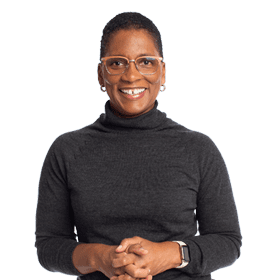Vice President Health Equity
Spectrum Health – BHSH System
FOCUS
Lynn’s vision for a Culture of Health is one in which all communities, regardless of racial or ethnic identity, socioeconomic status, sexual orientation, gender identity, physical and cognitive disability, and neighborhood residence, are able to achieve optimal health. Her vision is one in which all communities have the social, economic, and other resources and opportunities required for good health. Lynn’s work focuses on advancing an anti-racist, health equity agenda within the context of a healthcare system and community that adheres to a conservative social and political narrative in which the concepts of structured advantage and disadvantage are anathema to prevailing principles.
Lynn’s vision emerged out of an experience, nearly two decades ago, visiting neighborhoods on the South Side of Chicago where she grew up. As she surveilled the communities, it occurred to her that their social and economic conditions would make it nearly impossible for their residents to achieve good health. It was at this point that she launched her journey to advance a health equity agenda, focusing on the needs of African American communities in urban areas.
Her recent work, which is the focus of her Culture of Health leadership experience, centers on Benton Harbor—an African American community in southwest Michigan that has been subject to decades of social, political, and economic decline (e.g., low high school completion rates, poor housing stock, limited employment opportunities), and exhibits many of the predictable health outcomes such as high prevalence of chronic disease (e.g., heart disease and diabetes) and low life expectancy. Lynn’s approach in addressing the needs of this community is to educate stakeholders—inside the healthcare systems and surrounding communities—on the structural forces, such as racism, that create and sustain health inequities and the mutual benefit associated with advancing health equity.
STRATEGIC INITIATIVE: Lakeland Public Health Strategy Development
There are significant racialized health inequities in the service area of Spectrum Health Lakeland. The life expectancy in majority-black neighborhoods is up to 19 years shorter than life expectancy in some majority-white neighborhoods. The age-adjusted mortality rate in some majority-black neighborhoods is roughly five times greater than that in some majority-white neighborhoods. My strategic initiative involves the development of a population health strategy to address these health inequities. The area of focus is a regional health system and the community it serves. The committed/ideal community partners, some of which are already engaged and committed, include community residents who experience health inequities, stakeholders representing the healthcare system, and stakeholders representing key health determinants, such as housing, education, and public safety.
MORE ABOUT LYNN
Lynn is a formally trained urban planner who has committed her professional career to addressing the needs of urban communities. Her work has been informed by living for nearly 15 years in countries outside of the United States where robust social safety nets help ensure that communities have what they need—housing, food, education, employment, transportation, social cohesion, and clean air and water—to achieve good health. Lynn is driven by a commitment to use her privilege in service of others. She is motivated by biblical verse, “From everyone who has been given much, much will be demanded; and from the one who has been entrusted with much, much more will be asked.”
Click here to watch Lynn’s Legacy Project video.

